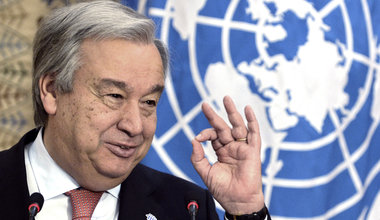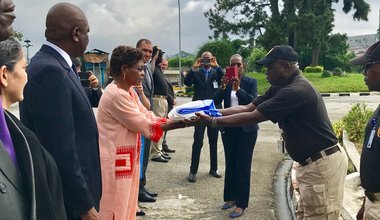UNOCI PARTICIPATES IN THE CONSTRUCTION OF A WATER SUPPLY SYSTEM IN DALOA PRISON
Daloa, 17 August 2009...The United Nations Operation in Côte d'Ivoire (UNOCI) and the United Nations Development Programme (UNDP) have built a water supply system in the central prison in Daloa.
UNOCI provided funding worth 10 million FCFA through its Quick Impact Projects (QIPs) programme. The work involved the installation of a 70 metre-long electric pump and two large water towers that can permanently supply the precious liquid to prisoners in case of a breakdown in the supply from the Ivorian water company, Société de Distribution d'Eau de Côte d'Ivoire (SODECI).
During a ceremony organised on Monday in front of the offices of the prison, Corbeil Siakam, acting head of the regional office of UNOCI's Rule of Law section, stated that the Mission "has given priority to the project, among so many others, due to the urgency of the situation". He added that "the choice of this project results from a crucial need presented by the prison authorities". The prison, which was built to accommodate fewer than 300 prisoners, today has more than 1,200 persons.
The representative of the United Nations Volunteers (UNV) office, Michaëla Zveckova said the project was specially aimed at promoting an environment, favourable to the implementation of UNOCI's mandate and at improving the daily lives of prisoners'.
The Deputy Manager of the prison, Désiré Dasié, thanked UNOCI for its actions to help improve prisons in Côte d'Ivoire in general and in particular Daloa prison. Assessing the impact of the project, he said that it would allow the prison to have a continuous water supply and thus contribute to the prisoners' well-being.
Francis Turlotte, President of the international NGO Prisoners without Borders and manager of the project, highlighted its importance for the beneficiaries – who are incarcerated – and who, according to him, are among the most underprivileged groups in society.
 ONU
ONU Nations Unies Maintien de la paix
Nations Unies Maintien de la paix



